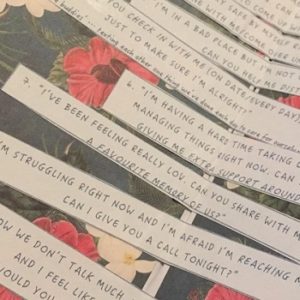
 Hello everyone… happy mental health and wellbeing week!
Hello everyone… happy mental health and wellbeing week!
My name is Karyn and I’m currently in my fourth year of studying medicine at Edinburgh. The topic of mental health is incredibly close to my heart as I myself started having panic attacks midway through senior school, and more recently have really struggled with depression. I am, and believe that to some extent always will be, hesitant to say that I am ‘recovered’ but it does feel authentic to say that I am well along the road to recovery.
Over the past year, my mental health journey has introduced me to a number of utterly incredible and selfless people, all of whom have been brave enough to share testimonies of their experiences with mental illness. This, in turn, has inspired me to be more and more open about my own story.
As much of my experience with mental illness still remains rather raw, I place a great deal of importance on actively nurturing my mental health and wellbeing wherever and however I can. Hence, I would love to share a few strategies that I have found to be incredibly helpful in taking care of myself in this way.
These are:
 Surround yourself with cheerleaders
Surround yourself with cheerleaders
This may seem somewhat like stating the obvious, but really what matters is feeling supported by people who truly want you to get better… for YOU. These people are the ones who will stick with you throughout the hard times and yet won’t indulge in the negative behaviours that you’re trying to leave behind. They will meet you first with kindness but also won’t shy away from telling you the honest truths. Sometimes we can forget just how hard it can be to support someone through mental illness, and so the ones who stick by you really are to be treasured.
Your loved ones might not understand, and that’s okay.
When I reached out to some of my nearest and dearest about suffering with depression, their first responses were ‘I don’t know what to say – I wish I knew how to help you’.
For me, this was enough. It took explaining that what I needed from my loved ones wasn’t an ‘answer’ or solution, it was just for them to be there.
Being open to my friends and family about the prospect of having suicidal thoughts was extremely uncomfortable, as my natural first instinct was always to try to ensure that they didn’t worry – that they weren’t burdened. But I knew myself that what would help both of us most in the long run was to be as open and honest as possible, and sometimes that meant entirely submitting and asking for help when I was at my lowest and most vulnerable.
Sometimes when I didn’t know what to say, or how to say it, I found great solace in writing down everything I was feeling in that present moment. These words were just for me, and represented a safe place that I could retreat to whenever things felt too much. This led to the experience of performing my poetry at a RealTalk mental health event last year and enabled me to connect with an amazing group of fellow students, all of whom had experienced personal struggles with mental health.
RealTalk is an amazing example of how reaching out to others and sharing your story can be incredibly empowering, and also help others to gain a greater understanding. Details of how to become an audience member or speaker can be found on their website: www.realtalkproject.org
 Your body is your own compass towards wellness.
Your body is your own compass towards wellness.
The most amazing thing about the human body is that it tells you what it needs.
Hungry? — your stomach grumbles.
Tired? — your eyelids close.
Emotional and spiritual burn out? — It is no different.
It has taken me this year to realise that the feelings I was experiencing were no accident. They were a message. And the thing about this message was – the longer I ignored it, the stronger it grew (concrete examples).
No two people’s experiences of mental health or illness will ever be the same, and so the biggest way you can support yourself is to become the expert of your own experience. Learn to read your body’s signals and warning signs – it just takes for you to listen.
One resource that I find invaluable is Philome’s interactive self-help guide, rather comically named – ‘You Feel Like Sh*t’, which is specifically designed to help you to tune in to what your mind and body may be needing at that present moment.
 Help you to look after you.
Help you to look after you.
For me, one of the hardest aspects of depression was that when I was/am low, I often couldn’t/can’t actually remember how it feels to feel happy. It genuinely would feel as if my entire life had, and forever would be, spent under a cloud of hopelessness.
And so I found that it massively helped to try and make the most of the time when I was better, to help prepare for the times when I might feel unwell. This translated to writing out a page of ‘strategies’ for the bad days, mental health conversation starters (above), and reminders of my strengths.
There was something about reading these words written out in my own handwriting that made it seem a hundred times more possible that I might get back to that place of ‘lightness’ once again – like I was leaving myself a trail of breadcrumbs, leading me back to where I wanted to be.
Prepare for bumps in the road.
Without wanting to end on a despondent note, it is a necessary part of this journey to acknowledge that the path to recovery will never be straightforward.
I now haven’t experienced a severe panic attack for several years. However, at the time when I had just started to deal with my anxiety, any time that I felt I was slipping into that same sense of panic, I would scold myself for setting myself back again – even when I was able to achieve my goal, in spite of the fear. In time I came to view this much like a ‘wobble’ after getting back on a bike. The crucial point is – I got back on.
Throughout our medical careers we all will face the unique challenges and experience the unique pressures that come hand in hand with the immeasurable privilege that is a medical vocation. What is important is re-training yourself to actively recognise and nurture your body’s needs and develop healthy attitudes and behaviours from as early-on as possible, to ensure that – when things get tough – you have a system in place.
Core to this, I believe, is just remembering to be kind to yourself.



